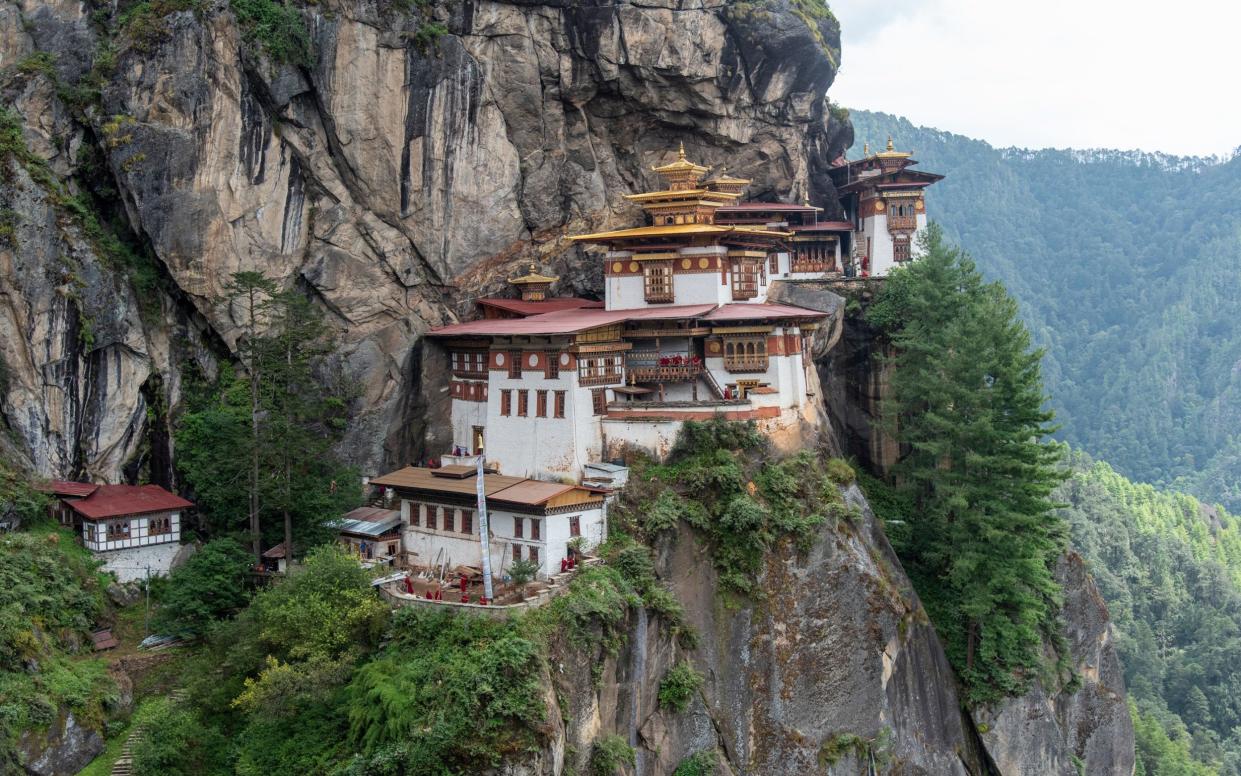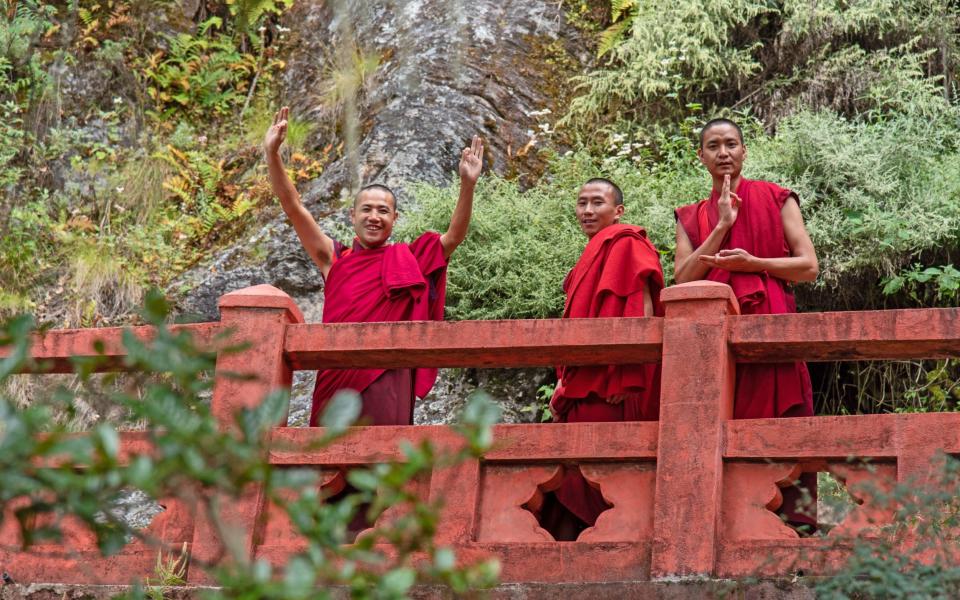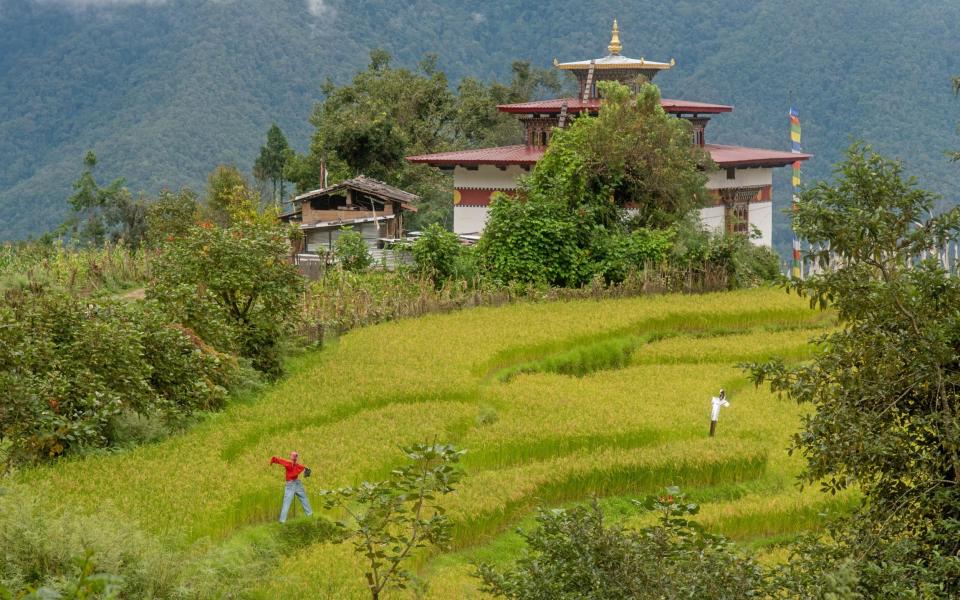Bhutan’s new mega-city could mean the end of the planet’s most peaceful place

“One of our biggest challenges is being seen as this locked-up mountain kingdom,” a Bhutanese politician complained to me during my visit to the tiny Himalayan land of the thunder dragon in late 2022. I’d come to join the prime minister, members of government and enthusiastic locals on an inaugural hike along the new Trans Bhutan Trail – a revived network of ancient trading paths.
Like many of the tourists in my party, I’d been lured by the mystery of what lay behind the golden temples and snow-capped peaks of a country which only opened to tourism 50 years ago.
Bhutan’s drawcard has always been its elusiveness. A nation built on the principles of Buddhism and a philosophy of “Gross National Happiness” seems so foreign and exotic in a world booming and busting under capitalism that Bhutan may as well be on Mars.
Education and healthcare are free, there are no advertising billboards or major fast-food chains (junk food addicts in capital city Thimphu have their own KFC – Karma Fried Chicken) and this was the first country in the world to be declared carbon negative. It all adds up to a real-life Shangri-La.
But things are inevitably changing. At the end of last year in an address to the nation, King Jigme Khesar Namgyel Wangchuck announced ambitious plans for a new urban development intending to put Bhutan on the economic map. Spanning 250,000 acres (2.5 per cent of the mountainous country), Gelephu Mindfulness City will include residential neighbourhoods, healthcare, spiritual and cultural centres, a university and an airport.
“The Gelephu Masterplan gives form to His Majesty’s vision to create a city that becomes a cradle for growth and innovation while remaining founded on Bhutanese nature and culture,” says Bjarke Ingels, founder and creative director of Bjarke Ingels Group (BIG), the architects commissioned to see through the ambitious project. “We imagine the Mindfulness City as a place that could be nowhere else.”
It’s a commendable concept; an attempt to balance the demands of economic development with the needs of spiritual wellbeing. But the cynic in me wonders if that’s humanly possible. Could Bhutan’s lofty urban dream end up being nothing more than a Buddhist Disneyland or a nirvanic Center Parcs?
Tuning in to the outside world
To be fair, Bhutan’s rulers have been in a tricky situation for some time. A mass exodus of disillusioned youth seeking better job opportunities in Australia, India and Kuwait has resulted in 14,000 people (2 per cent of the population) leaving the country between 2018 and 2023, according to data from Paro International Airport.
“Unless we find the right solution, our population may dwindle to the point where we have more shops than customers, more restaurants than diners, and more houses than tenants,” said His Majesty in his public address.
When I first visited Bhutan in 2010, internet connection was patchy. Now 3G is everywhere and the trappings of a materialistic outside world are hard to resist. Even before that, the arrival of TV sets had an impact. “We used to eat dinner in a circle, but now we all sit in a U-shape,” one Bhutanese local joked to me.

Bitcoin and biodiversity
The need for development is there but it undoubtedly comes at a cost – usually that’s the environment. Part of the Mindfulness City masterplan involves a new hydroelectric dam, an industry that’s overtaken tourism as the country’s primary source of revenue.
But organisers insist nature is at the forefront of the project: residential areas will be low-density and low-rise, transport will run on clean energy, and biodiversity corridors will allow elephants and other wildlife to move freely. Considering electricity lines in the Phobjikha Valley were carefully laid underground to avoid disturbing flocks of black-necked cranes arriving from Tibet every October, it’s highly conceivable these claims will be followed through.
Besides, plans for future development are mainly in the less invasive tech sphere: blockchain projects, green cryptocurrency mining and drone testing are already underway. “With our cool temperatures and hydro power, we could become a major hub for data centres,” one ambitious Bhutanese politician told me.
The Bhutan blueprint
Bitcoins are a world away from the auspicious pennies showering Buddhas in temples, but all these changes have positive benefits for tourism too. Regarded by pilots as one of the most difficult airports in which to land, Paro has limited flights and expensive seats sell out quickly. A new airport in a better location will undoubtedly make access easier.
Jigme Dorji, a local guide working through the TravelLocal platform, predicts that the Mindfulness City could even be a blueprint for future tourism.

“It comes at a time when slow travel and prioritising rest and wellbeing is at the forefront of travellers’ minds. There are aspects of Bhutanese tourism which position the country as a pioneer that we could all learn from – especially preservation of cultural traditions and avoiding overtourism.”
Bhutan has always been a master of intrigue: no doubt visitors will flock to Gelephu simply to see what it’s like.
“It will take the collective effort of every Bhutanese to make this a success,” says a spokesperson for the Bhutanese Mindfulness City media team, aware of the many challenges ahead. “Bhutan will have to make up in energy and ingenuity what it lacks in numbers and economic capacity.”
The gates to the kingdom are well and truly open. Time will tell if its potential can be unlocked.

